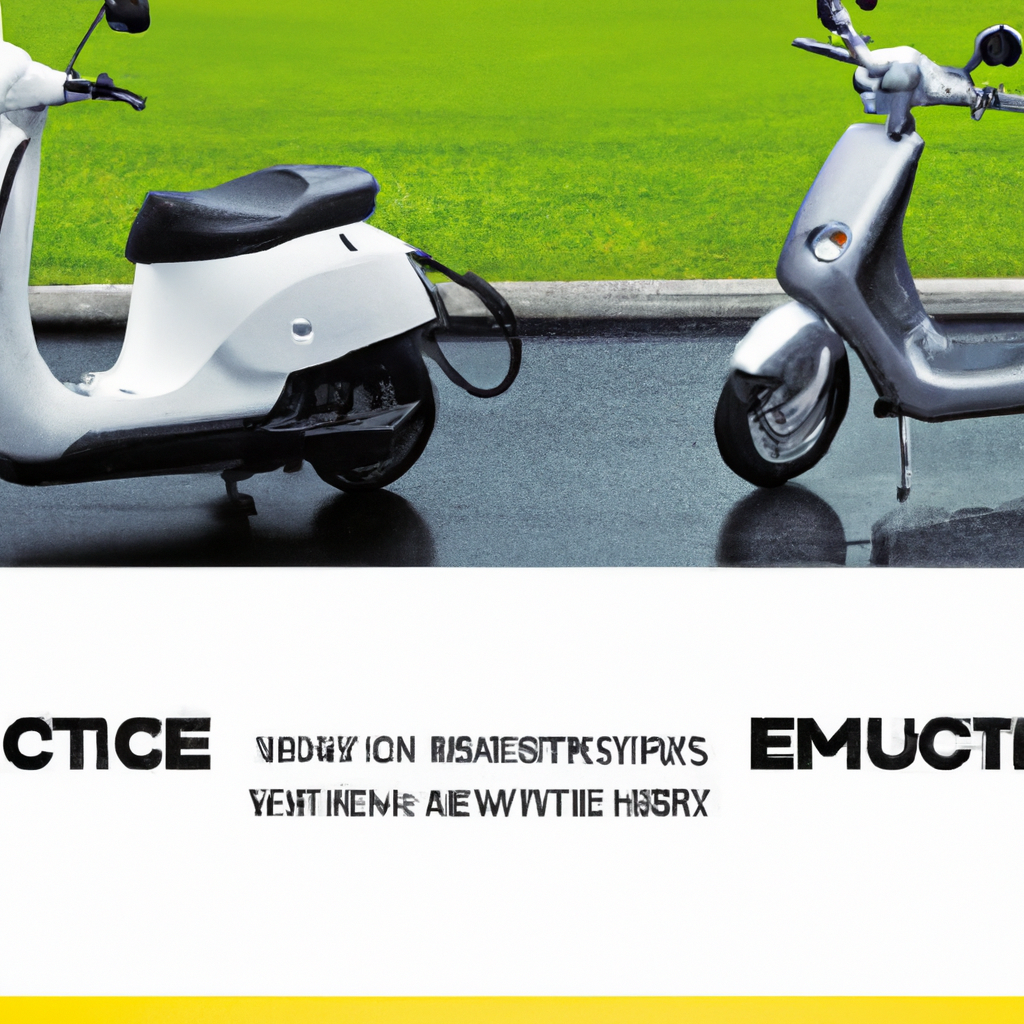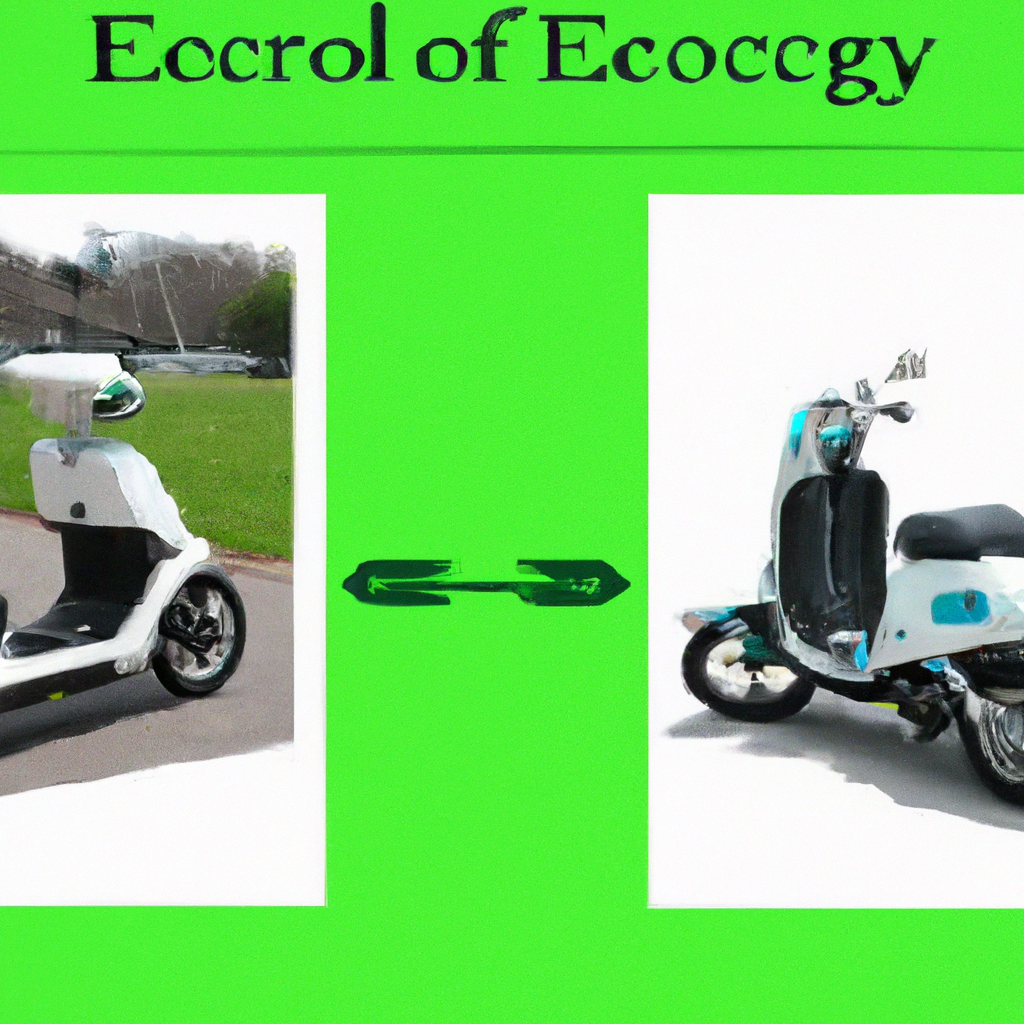In today’s fast-paced world, finding efficient and eco-friendly modes of transportation has become increasingly important. With the rise in popularity of electric scooters, many people are wondering how they compare to traditional cars. Electric scooters offer numerous advantages such as affordability, ease of maneuverability, and reduced carbon emissions. However, they also have their drawbacks, including limited speed and range. In this article, we will explore both the pros and cons of electric scooters compared to cars, allowing you to make an informed decision about which option suits your lifestyle and needs best.

Cost
Initial purchase cost
One of the significant advantages of electric scooters compared to cars is the lower initial purchase cost. Electric scooters are generally more affordable, making them a great option for people on a budget or those who are looking for a cost-effective means of transportation. You can get a brand new electric scooter for a fraction of the price of a car, and even high-quality models are much more affordable.
Operational costs
Electric scooters also have lower operational costs compared to cars. Electric scooters use rechargeable batteries, which cost significantly less to charge compared to the price of gasoline or diesel fuel required for cars. Additionally, Electric scooters require less maintenance through routine oil changes, spark plug replacements, or engine maintenance, saving you money in the long run.
Maintenance costs
When it comes to maintenance costs, electric scooters have another advantage over cars. Electric scooters have fewer moving parts compared to cars, which means there are fewer components to break or wear out. As a result, the overall maintenance costs of an electric scooter are lower, as you won’t need to spend as much on repairs or replacements. This also means less time spent at the mechanic and more time enjoying your rides.
Environmental Impact
Emissions
One of the most significant advantages of electric scooters over cars is their lower emissions. Electric scooters produce zero tailpipe emissions since they run solely on electricity. This helps reduce air pollution and contributes to a cleaner environment. In contrast, cars emit greenhouse gases and pollutants, contributing to climate change and worsening air quality in urban areas. By choosing an electric scooter, you can make a positive impact on the environment and help combat climate change.
Energy consumption
In terms of energy consumption, electric scooters have an advantage over cars. Electric scooters are highly efficient and require much less energy to operate compared to cars. They have smaller batteries, which can be recharged quickly using a regular power outlet. On the other hand, cars consume a significant amount of energy in the form of gasoline or diesel fuel, which leads to higher energy consumption and further depletes finite fossil fuel resources.
Convenience and Accessibility
Parking
When it comes to convenience and accessibility, electric scooters are the clear winner. With their compact size, electric scooters can be easily parked in tight spaces, making it convenient to find parking even in crowded cities. This eliminates the need to search for larger parking spots or pay for expensive parking fees. Furthermore, electric scooters can often be parked for free in designated scooter parking areas, making them a convenient and cost-effective option for urban commuters.
Traffic congestion
Another advantage of electric scooters is their ability to navigate through traffic congestion. In busy urban areas, cars can often get stuck in long queues during peak hours, resulting in wasted time and frustration. Electric scooters, on the other hand, can weave through traffic and take alternate routes, allowing you to reach your destination faster and avoid the hassle of traffic jams. This makes Electric scooters a convenient mode of transportation, especially for short daily commutes or running errands.
Range and Speed
Distance coverage
While electric scooters are great for short commutes, they may not be suitable for longer distances. Electric scooters typically have a limited range and may require frequent recharging if you intend to travel long distances regularly. On the other hand, cars offer a more substantial range, allowing for longer trips without the need for frequent refueling. If your daily travel needs involve shorter distances, such as commuting to work or school, an electric scooter may be a perfect fit. However, for longer journeys, cars provide a more practical option.
Top speed
Electric scooters are known for their relatively lower top speed compared to cars. Most electric scooters have a top speed ranging from 15 to 30 miles per hour, depending on the model and local regulations. While this speed is sufficient for urban and suburban areas, it may not be ideal for highway travel or long-distance trips. For those who need to travel at higher speeds consistently, cars offer a greater advantage as they have higher top speeds and can handle different terrains and road conditions more efficiently.

Safety
Crash protection
In terms of crash protection, cars generally offer better safety features compared to electric scooters. Cars are equipped with advanced safety features like airbags, seat belts, anti-lock braking systems, and crumple zones that provide an added layer of protection in the event of a crash. Electric scooters, on the other hand, have less structural protection and lack these safety features. However, it’s important to note that both electric scooters and cars require responsible and cautious driving to minimize the risk of accidents and ensure personal safety.
Vulnerability to accidents
While electric scooters may not offer the same level of crash protection as cars, they have certain advantages in terms of maneuverability and visibility. Electric scooters are more nimble and can easily navigate through tight spaces and crowded areas, reducing the likelihood of collisions. Additionally, their compact size makes them more visible to other motorists, increasing overall road awareness. However, it’s crucial to prioritize safety by wearing appropriate safety gear, adhering to traffic rules, and staying alert while riding both electric scooters and cars.
Infrastructure
Charging stations
The availability of charging stations is a crucial infrastructure factor for electric scooters. While the number of charging stations is increasing, the infrastructure for electric scooters still has room for improvement. In some areas, especially in rural or less developed regions, finding a conveniently located charging station can be a challenge. This may limit the usability and convenience of electric scooters, particularly for those who rely on them for longer commutes. However, the growing popularity of electric scooters is driving the development of charging infrastructure, leading to more accessible and widespread charging options.
Road conditions
Another aspect of infrastructure to consider is road conditions. Both electric scooters and cars require suitable road conditions for safe and comfortable travels. However, due to their smaller size and nimble nature, electric scooters may have slightly more flexibility in dealing with road imperfections like potholes or narrow lanes. Cars, on the other hand, require wider and well-maintained roads, which can sometimes limit their accessibility in certain areas. Improving road conditions benefits both electric scooters and cars, ensuring a smoother and safer transportation experience for all users.

Health Benefits
Physical activity
One of the significant health benefits of electric scooters compared to cars is the physical activity they provide. Riding an electric scooter requires balance, coordination, and muscular effort, providing a form of low-impact exercise. Regular scooter rides can help strengthen leg muscles, improve cardiovascular fitness, and contribute to overall physical well-being. Furthermore, the active nature of electric scooters can help incorporate physical activity into your daily routine, promoting a more active and healthy lifestyle.
Reduced stress
Commuting in heavy traffic or being stuck in long queues can often be a source of stress for many individuals. Electric scooters offer a solution to this stress by providing a more enjoyable and stress-free commute. With the ability to maneuver through traffic and take alternate routes, electric scooter riders can experience less stress and frustration while traveling. The open-air experience and the freedom of movement on an electric scooter can also contribute to a more relaxing and enjoyable journey, benefiting both mental and physical well-being.
Comfort
Seating
Electric scooters generally have a more limited seating arrangement compared to cars. Most electric scooters are designed for one rider, while cars can accommodate multiple passengers comfortably. This may be a disadvantage for those who frequently travel with family or friends. However, for solo riders, electric scooters can provide a comfortable seating position and a more open-air experience, allowing for a greater sense of freedom and connection with the surrounding environment.
Climate control
In terms of climate control, cars offer more options compared to electric scooters. Cars come equipped with heating, ventilation, and air conditioning systems, providing a controlled and comfortable environment regardless of external weather conditions. Electric scooters, on the other hand, rely on natural airflow for temperature regulation. While this may be sufficient in moderate climates, extreme heat or cold weather can impact rider comfort on an electric scooter. However, with appropriate clothing and gear, riders can adapt to different weather conditions and still enjoy comfortable rides on electric scooters.

Technology and Innovation
Features and advancements
Electric scooters have seen considerable advancements in recent years, with manufacturers incorporating various cutting-edge technologies and features. Many electric scooters now come equipped with LED lights, digital displays, Bluetooth connectivity, and smartphone apps to enhance user experience and safety. Additionally, some models offer regenerative braking, which helps charge the battery while braking, further extending the range of the scooter. As technology continues to evolve, we can expect to see even more innovative features and advancements in electric scooters.
Integration with smart devices
Electric scooters have embraced the era of smart devices, allowing for seamless integration with smartphones and other gadgets. Many electric scooters can be connected to smartphone apps that provide real-time data on battery life, distance covered, and even navigation assistance. This integration makes it easier for riders to track their rides, plan routes, and monitor scooter performance. With the increasing popularity of smart devices, this integration offers added convenience and accessibility to electric scooter users.
Social Perception
Cultural norms
The social perception of electric scooters compared to cars can vary across different cultures and regions. In some areas, cars may be seen as a status symbol or a sign of wealth, while electric scooters are regarded as a more practical and eco-friendly mode of transportation. Electric scooters may be embraced as a trendy and modern means of getting around, particularly in urban environments where sustainability and environmental consciousness are prioritized. However, the social perception of electric scooters and cars ultimately depends on a mix of cultural norms, personal preferences, and local attitudes towards alternative transportation options.
Image and social status
The choice between electric scooters and cars can also be influenced by image and social status. Owning a car may carry a certain level of prestige and can be seen as a symbol of success or an indicator of financial stability. On the other hand, electric scooters may be associated with a more minimalist lifestyle or a commitment to reducing carbon emissions. The perception of image and social status can play a role in the decision-making process when choosing between an electric scooter and a car, with individuals considering personal values, lifestyle choices, and the image they want to project.


